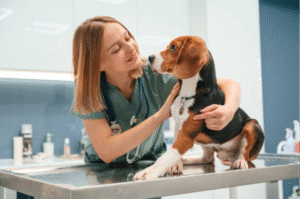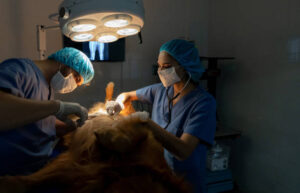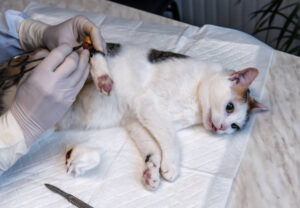At Happy Tails Animal Hospital in Renton, WA, Dr. Arshdeep Mann and his dedicated team are committed to providing compassionate, state-of-the-art care for pets undergoing surgical procedures, including anal sacculectomy. This surgical intervention, while not commonly discussed, can be a crucial solution for pets suffering from chronic anal gland issues. This guide aims to demystify anal sacculectomy, outlining why it’s performed, what pet owners can expect from the procedure, and how to ensure a smooth recovery for their beloved companion.
Understanding Anal Sacculectomy
Anal sacculectomy is a surgical procedure aimed at removing the anal sacs. In pets, these glands can sometimes cause significant discomfort, infection, or even abscesses due to impaction or other complications.
Why It’s Performed
- Chronic Infections and Impaction: Frequent infections or impaction of the anal glands can lead to severe discomfort and potential systemic health issues.
- Anal Gland Abscesses: An abscess can form if an infection progresses, requiring immediate surgical intervention.
- Tumors: Although less common, tumors within the anal glands necessitate removal of the affected tissue to prevent cancer spread.
The Procedure: What to Expect
Dr. Mann ensures that pet owners are fully informed about the procedure, which typically involves:
- Pre-surgical Assessments: This includes blood work and possibly imaging to evaluate the pet’s overall health and the extent of the glandular issue.
- Anesthesia: Anal sacculectomy is performed under general anesthesia to ensure the pet’s comfort and immobility during the procedure.
- Surgical Removal: The anal sacs are carefully excised, and the area is sutured to promote healing.
Recovery and Aftercare
Post-operative care is critical for a successful recovery. Dr. Mann provides comprehensive guidance on:
- Pain Management: Pain relief is a priority, with medications prescribed to manage discomfort during healing.
- Infection Prevention: Antibiotics may be administered to prevent infection at the surgical site.
- Activity Restriction: Limiting your pet’s movement and avoiding excessive strain on the surgical area is essential for proper healing.
- Follow-up Visits: Monitoring the healing process through scheduled check-ups ensures any complications are addressed promptly.
Ensuring a Smooth Recovery
The team at Happy Tails Animal Hospital is dedicated to supporting pet owners through their pet’s recovery, offering advice on:
- Diet and Hydration: Ensuring your pet maintains a balanced diet and stays hydrated is crucial for healing.
- Hygiene: Keep the surgical area clean and monitor for signs of infection.
- Comfort and Support: Providing a quiet, comfortable space for your pet to rest and recover is vital.
The Role of Happy Tails Animal Hospital
Choosing to proceed with an anal sacculectomy for your pet can be a difficult decision, but Dr. Arshdeep Mann and the team at Happy Tails Animal Hospital are here to provide the care, support, and expertise needed every step of the way. From the initial consultation to post-operative care, our goal is to ensure the health and comfort of your pet.
Anal sacculectomy, while a significant procedure, can vastly improve the quality of life for pets suffering from chronic anal gland issues. Dr. Arshdeep Mann and the compassionate team at Happy Tails Animal Hospital are dedicated to ensuring that pets in Renton, WA, receive the highest level of surgical care and post-operative support. For more information on anal sacculectomy or to discuss your pet’s health concerns, contact Happy Tails Animal Hospital at 425-254-2779. Together, we can provide a pathway to relief and recovery for your pet.
Sources:
- Journal of the American Veterinary Medical Association (JAVMA): Studies on the indications for and outcomes of anal sacculectomy in pets.
- American College of Veterinary Surgeons (ACVS): Provides information on anal gland diseases and the surgical procedures used for treatment, including anal sacculectomy.
- Veterinary Clinics of North America: Small Animal Practice: Features articles on the management of anal gland conditions in pets and surgical intervention strategies.





